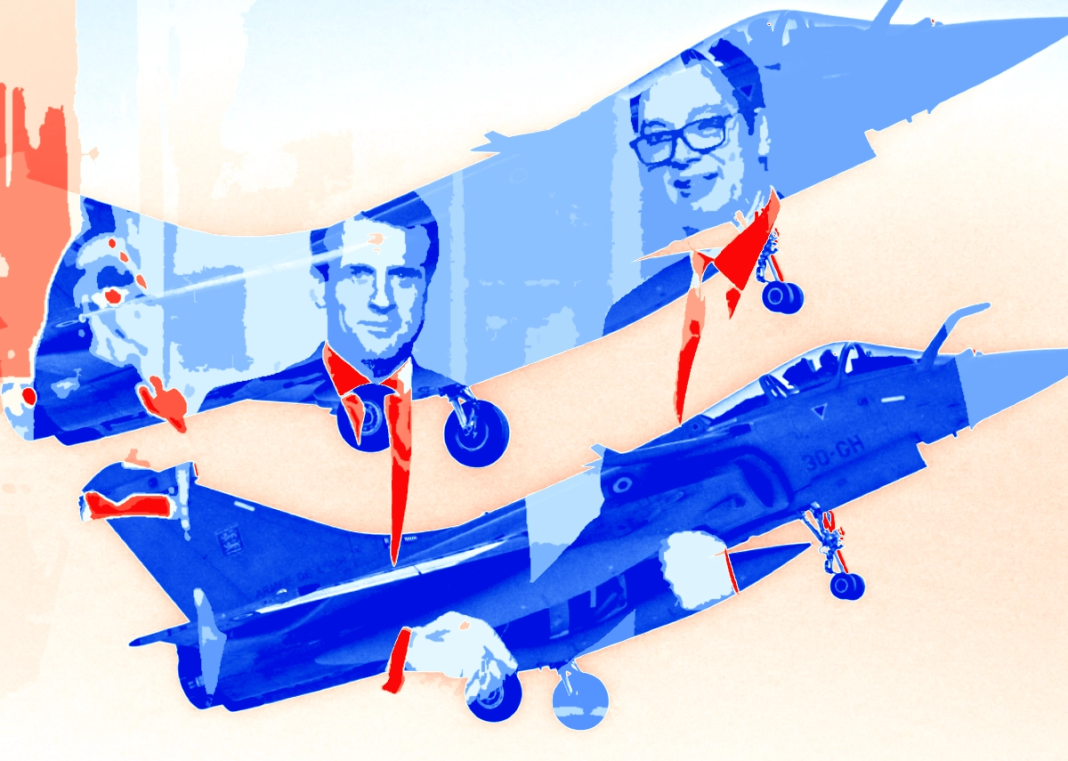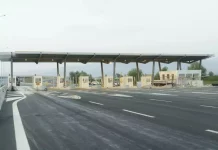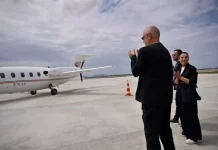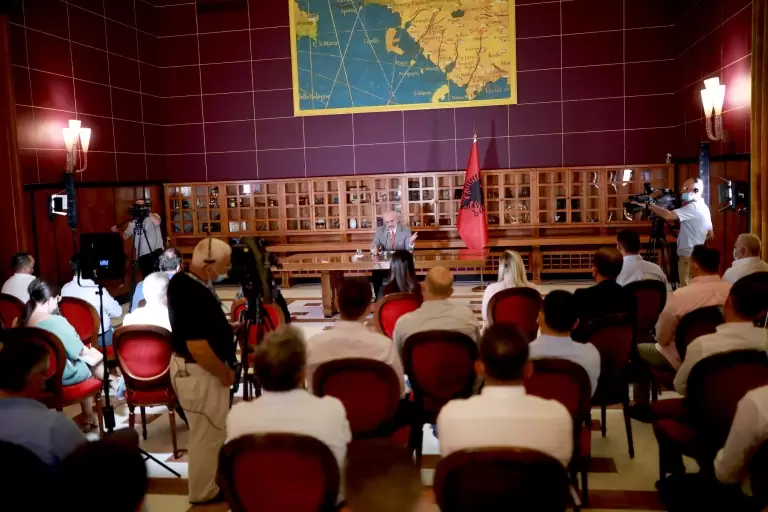During President Vučić’s visit to Paris in early April, Albanian media reported on an agreement for Serbia to buy 12 fighter jets from France. However, a detailed investigation and verification by Faktoje found no evidence of this agreement, which has been claimed only by Serbia. French media, on the other hand, report that France lacks ‘geopolitical’ guarantees. So far, the news about Serbia’s purchase of fighter jets appears to have been more about generating clicks for websites than providing the public with truthful information.
Eno Luarasi
President Vučić’s two-day visit to Paris in early April 2024 wasn’t just about reaffirming ties between Serbia and France.
Following his meeting with the French President, Vučić expressed great optimism, announcing an agreement for Serbia to purchase fighter jets manufactured by France.
‘We have reached a concrete agreement, as far as I understand, regarding the purchase of Rafale jets. I expect the contract to be signed within the next two months, in the presence of the French President, who is very important for our country‘-Vučić said in Paris. This announcement was extensively covered by Albanian media, often within narratives speculating on potential conflict in the Balkans. Serbia was depicted as significantly bolstering its military capabilities and engaging in strategic maneuvers to maintain relationships with Russia and China while intensifying diplomatic efforts to improve ties with the West. The news of the Rafale fighter jet purchase agreement was reported with such ‘certainty’ that one headline read: ‘Serbia set to purchase 12 fighter jets from France, details emerge from the agreement’.

| Serbia set to purchase 12 fighter jets from France, details emerge from the agreement |
*The portal’s screenshot title concerning the claimed Vučić-Macron agreement
Quoting the Serbian Ministry of Defense in the article, it is claimed that details of the agreement have been unveiled. However, no document or source is provided to validate the existence of such a deal.
According to media reports, Vučić declared the contract’s signing with the French aircraft manufacturer within two months, effectively concluding by June. Nevertheless, one month after this statement, there has been no announcement confirming the contract’s finalization.
Was the agreement to purchase the aircraft really reached?
As the news of the Rafale aircraft purchase continued to circulate, unsupported by any document proving its existence, French television BFMTV, in a report, emphasized the refusal to discuss the sale of aircraft to Serbia, as France had conditioned such an agreement.

‘Dassault Aviation is currently refusing to discuss a possible sale of aircraft to Serbia. The deal, involving a dozen aircraft, could bring three billion Euros to France. However, Paris aims to secure confirmations about political developments in the country before finalizing the purchase‘ – reported BFMTV.

Faktoje.al failed to obtain an official response from Dassault Aviation, despite sending multiple requests for detailed information on the matter. However, their investigations did not uncover any evidence of an agreement or contract, let alone one signed by both parties, for Rafale fighter jets between Serbia and France.
How threatened is Kosovo by the war narrative?
In an interview with Faktoje.al, Kosovo’s Minister of Defense, Ejup Maqedonci, was asked about Serbia’s attempt to purchase such aircraft and how much it concerns Kosovo. He emphasized that while it is a state’s prerogative to invest in its military arsenal, what truly matters is the action taken.
‘The significance of such an action varies when it is directed towards an arsenal primarily geared for offense, especially coming from a hegemonic state like Serbia, which has consistently posed threats to Kosovo through its actions. Serbia hasn’t merely refrained from conducting military exercises near Kosovo’s borders but has also orchestrated and funded the September 24th attack in Banjskë and maintained parallel structures in the northern region of the country. This poses the question: who are they truly defending against? Certainly not Kosovo, as we’ve never exhibited aggressive behavior towards Serbia, nor have neighboring states taken such a stance towards this country‘. – Ejup Maqedonci

According to security expert in Kosovo, Arben Dashevci, France’s reluctance stems from the absence of assurances from Serbia.
‘If Serbia had the same guarantees as Croatia did, there would have been potential for further negotiations. However, since Serbia did not provide these guarantees, further negotiations are not possible. In my opinion, Serbia’s arming is about an arms race to dominate the Balkans, similar to the old system of the ‘Butcher of the Balkans,’ Milosevic, in the 1990s. Therefore, the current establishment there still maintains Milosevic’s mindset because Serbia is not threatened by anyone. Its goal is to intimidate its neighbors with this futile arms race, especially considering that Serbia’s neighbors are NATO members or NATO has missions there’– Arben Dashevc

What are Rafale aircraft?
Rafale is a French-made aircraft. It entered service in 2001 with the navy, being deployed from the aircraft carrier Charles de Gaulle. The aircraft in question belongs to the 4+ generation. Until 2023, a total of 259 such aircraft had been built. There are 6 operators, including France, that have it in their armed forces. Initially, it was used in combat in Mali, Afghanistan, Iraq, and Syria.

According to security and international relations expert Fetah Fejzullahu, Rafale aircraft are highly versatile and can be used for a wide range of missions.
‘Rafale Jet is an aircraft with unique features. Let’s not forget that the acquisition of military equipment serves several purposes:
1.Meeting offensive/defensive requirements for operations
- Analyzing the strengths and weaknesses of the equipment in question
3.Adopting a model for the development of national military technology by the purchasing state
4.Establishing a countermeasure (indigenous technology) to deter potential attacks from other states’. – Fetah Fejzullahu

France, an important market for Serbia
Regardless of whether the agreement for Rafale fighter jets is reached or not, Serbia has a ‘positive’ track record of purchasing air assets from France. Previously, Serbia procured from one of France’s major military companies, Airbus, military helicopters H125M worth 105 million euros, 2 transport aircraft C-295 worth 66 million euros, and allocated around 15 million euros for equipment and training. Moreover, Serbia has acquired Mistral anti-aircraft systems with approximately 50 missiles.

Serbia-France Relations
In a historical context, the two countries have maintained diplomatic relations since the 19th century, with Serbian elites receiving education in France during that time. According to Ben Andoni, an analyst of regional affairs for Faktoje.al, the relations between the two countries are not only strong historically but also economically, despite occasional fluctuations.
‘France’s relationship with Serbia has been somewhat intricate since the bombing of Belgrade during the Kosovo War, but tensions eased when President Macron visited Belgrade in 2019. Recently, Vučić was warmly received in Paris, followed by Rama a few days later. In contrast to Albania, the Serbs are not only set to acquire “Rafale” aircraft but are also deliberating the future of energy. They are considering France’s assistance with nuclear reactors. However, this necessitates a legal framework change in Serbia and subsequent approval from the Atomic Structure, based in Vienna and subject to UN oversight. Belgrade Airport is operated by the French company “Vansi,” and it has been decided that one of the French companies will participate in the construction of the Belgrade metro. The Serbian capital authorities signed an assistance contract for this project, which reached a value of 944,000 Euros in early 2023“ – Ben Andoni.

Serbia’s Defense Budget and Armaments
According to World Bank data, Serbia has witnessed a significant increase in its military expenditure. From a budget of $710 million in 2016, it has escalated to $1.4 billion USD in 2022. Serbia allocates 2% of its gross domestic product to military spending, while its defense budget surpasses that of the combined budgets of the five Balkan countries by fivefold.

From 2014 to 2023, Serbia spent approximately 2.67 billion euros on defense, acquiring missile defense systems from China like the FK-3, equivalent to the Russian S-300, as well as Mi-17 and Mi-35 helicopters from Russia, along with Pantsir anti-aircraft defense systems.

The unofficial alliance between Serbia, China, Russia, and Iran
Serbia’s significant investments in defense along with the unofficial alliance between Serbia-China-Russia and Iran raises concerns for Kosovo’s Minister of Defense, Maqedonci.
‘The acquisitions from these states extend beyond mere financial transactions and indicate a mindset closer to Eastern authoritarian systems rather than Western pro-democratic policies’ stated the minister.
Military Exercises and Hybrid War
In April, Serbia conducted one of its largest military exercises, “Whirlwind 2024,” just a few kilometers from Kosovo’s territory. The exercise involved over 2,000 personnel and 350 military vehicles, including aircraft and suicide drone produced in Serbia, as well as those purchased from Iran.

‘Equally troubling are the 48 military bases Serbia has established around an independent state like Kosovo, which is why we remain vigilant in analyzing the situation. However, the military exercises conducted by the Kosovo Security Force are not a response to these actions but rather a continuation of the implementation of the KSF’s annual operational plan’, -Maqedonci stated for Faktoje.al.
Despite Serbia’s significant investments in defense, experts believe a conventional war or direct attack from Belgrade on Kosovo is improbable. ‘Serbia conducted military exercises on its territory in Peshtër, 3 km from Montenegro and 35 km from the Republic of Kosovo, and in the north, near the border with Bosnia-Herzegovina. This is part of its propaganda, especially considering Kosovo may join the Council of Europe on May 17. While there is ongoing social/hybrid warfare promoted by Putin’s Russia, a frontal war is not feasible- emphasized security expert Arben Dashevci.












